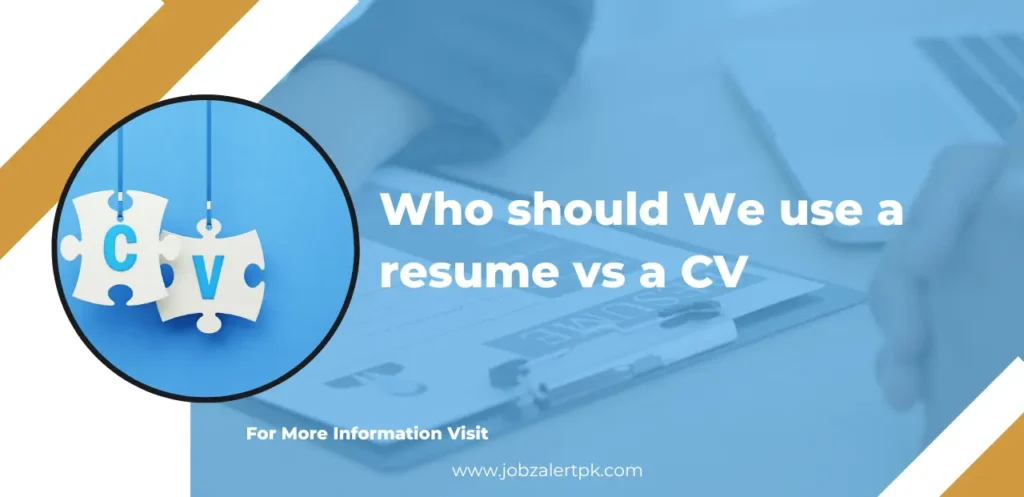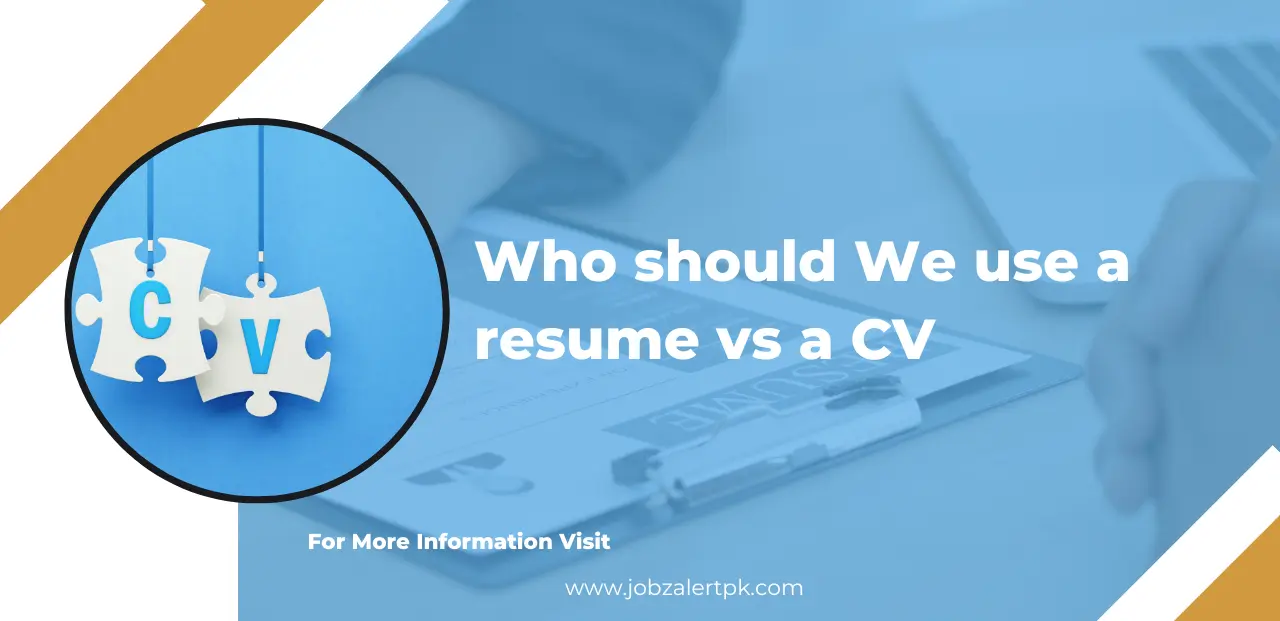A resume and a CV are two documents you use when applying for jobs. Both show your skills and experience but in different ways. Knowing when to use a resume or a CV is very important. In this article, we will talk about the differences between them and guide you on when to use each one.Who should We use a resume vs a CV
1. What is a Resume?
A resume is a short document that gives a quick summary of your work experience, skills, and education. It is typically one or two pages long. Resumes are used for most jobs in countries like the US and Canada. The main goal of a resume is to show an employer that you have the right skills and experience for the job.
Also Read About How To Make CV For Job
2. What is a CV?
A CV, or Curriculum Vitae, is a detailed document that includes everything you have done in your professional life. It is usually much longer than a resume and can include several pages. A CV is used mainly for academic jobs, research roles, or when applying in certain countries like Europe and Asia.
For Free Resume Builder

3. Key Differences Between a Resume and a CV
| Aspect | Resume | CV |
|---|---|---|
| Length | 1-2 pages | Several pages |
| Content | Focuses on work experience, skills, and achievements | Includes all professional and academic history |
| Use | For most jobs in companies | For academic, research, or medical roles |
| Region | Common in the US, Canada, and some other countries | Used in Europe, Asia, and for academic roles |
| Customization | Tailored for each job application | Fixed, includes everything from career to education |
4. Who Should Use a Resume?
If you are looking for a job in a company, a resume is the best option. It should give a quick snapshot of your qualifications, making it easy for hiring managers to see if you are a good fit for the job.
In countries like the US and Canada, most employers prefer resumes. If the job posting asks for a resume, you should follow the instructions and submit one. A resume is also the right choice if you are applying for jobs that focus on specific skills or experience.
Who Should Use a Resume:
- Job Seekers in Companies
- Professionals in the US and Canada
- Those applying for roles in marketing, sales, or tech jobs
5. Who Should Use a CV
A CV is best for roles in academia, research, or healthcare. If you are applying for a job at a university, a research lab, or in the medical field, a CV is required. It helps show your detailed work history, education, and other achievements like research publications.
CVs are also preferred in many countries outside of the US and Canada. If you are applying for a job in Europe or Asia, you will likely need to submit a CV instead of a resume. People with extensive experience, such as doctors, professors, or researchers, should use a CV.
Who Should Use a CV:
- Academics and Researchers
- Medical Professionals
- Job Seekers in Europe and Asia
- People with Detailed Career Histories
6. How to Choose Between a Resume and a CV?
Choosing between a resume and a CV depends on several factors. First, think about the industry you are applying to. If you are applying to a corporate job, the employer will likely expect a resume. On the other hand, if you are applying for an academic role, you should use a CV.
Also, look at the job listing. It may specify whether to submit a resume or a CV. Finally, remember that geography plays a big role. In the US and Canada, resumes are standard, while CVs are preferred in many other countries.
Tips to Decide:
- Check the Job Listing: It will often tell you what document to use.
- Think About the Role: Academic roles need a CV, while most jobs in companies need a resume.
- Consider the Country: A resume is standard in the US and Canada. A CV is preferred in Europe and Asia.
7. Tips for Crafting a Perfect Resume or CV
When creating your resume or CV, it’s important to keep a few tips in mind to make sure your document stands out.
For a Resume:
- Keep it simple and focused on the job you are applying for.
- Tailor your resume to highlight the skills and experience that are most relevant to the position.
- Use bullet points and clear headings for easy reading.
For a CV:
- Include all the details of your education, career, and research history.
- Organize it well, and make sure each section is clearly labeled.
- Be sure to include any publications, research, or awards you have earned.
Conclusion
Now that you know the difference between a resume and a CV, you can make the right choice when applying for jobs. If you’re applying for a corporate role, use a resume. For academic or research positions, a CV is the way to go. Always read the job posting carefully and consider where you’re applying to ensure you’re using the correct document.
FAQs
When should I use a resume?
You should use a resume when applying for jobs in the corporate sector or non-academic roles. It is ideal for positions in industries such as marketing, sales, IT, or any job where concise information on your experience and skills is needed.
How long should a CV be?
A CV can be much longer than a resume, sometimes several pages. It includes a complete history of your education, research, publications, and work experience. The length can vary depending on your career and achievements.
How long should a resume be?
A resume should ideally be 1-2 pages long. It should be concise and focused on the most relevant skills and experience related to the job you are applying for.
